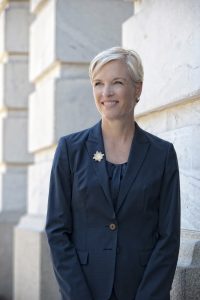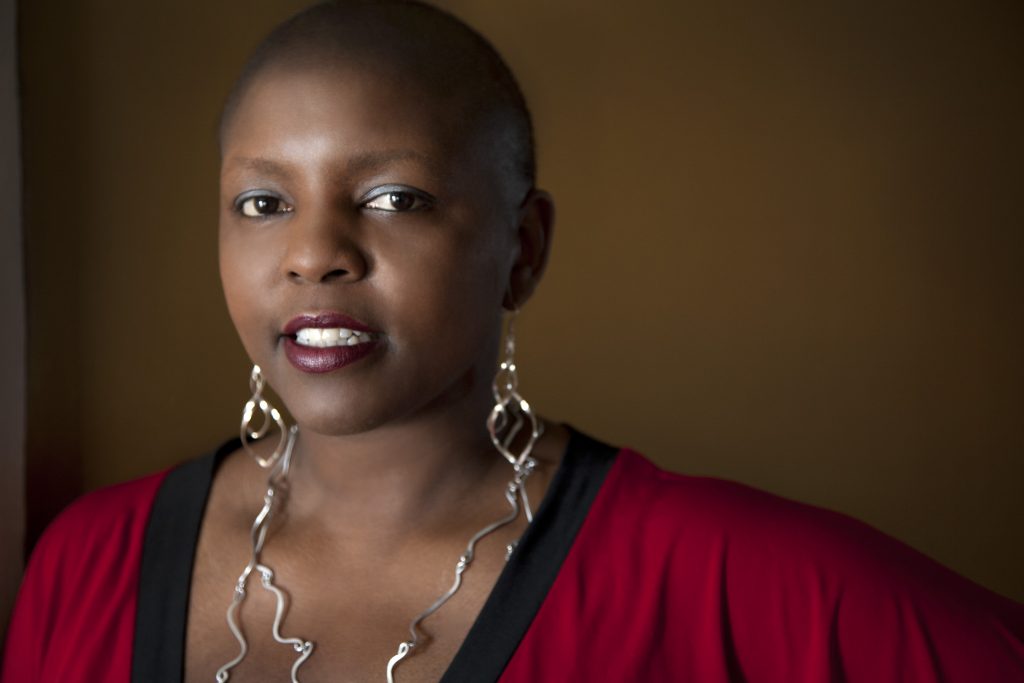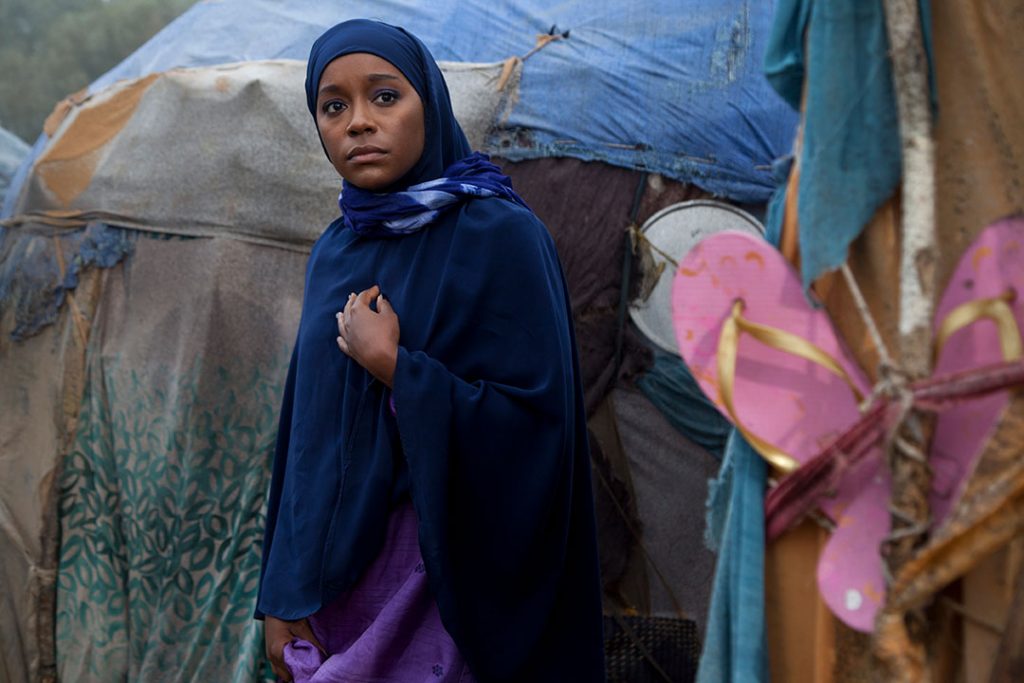July 21, 2019
by Carla Hay

When people think of the most versatile, talented actresses in the world, Oscar-winning Julianne Moore is sure to be on that list. She’s played a diverse array of characters in such a wide variety of films, that she’s also an actress who defies predictability when it comes to what types of projects she chooses. In the drama “After the Wedding,” she plays a hard-driving New York media mogul named Theresa Young, who is thinking about making a multimillion-dollar donation to an orphanage in Calcutta, India. The orphanage is run by a modest do-gooder named Isabel (played by Michelle Williams), who is the movie’s other lead female character.
Theresa and Isabel couldn’t be more opposite, and they have completely different lives. Theresa will give the donation on the condition that Isabel come to New York and meet with her in person. During the meeting, Theresa invites Isabel to the wedding of her 21-year-old daughter, Grace (played by Abby Quinn), who is one of Theresa’s three children. She also has 8-year-old fraternal twin sons with her husband, Oscar Carlson (played by Billy Crudup), a successful artist whose specialty is sculptures. It’s at the wedding that the lives of Theresa, Isabel and Oscar collide, as secrets and lies are exposed throughout the story.
“After the Wedding” (written and directed by Moore’s husband, Bart Freundlich) is an American remake of the 2006 Danish film “Efter Brylluppet,” whose stars included Mads Mikkelsen. “After the Wedding” is Moore’s second American movie remake of 2019. She also starred in “Gloria Bell,” Sebastián Lelio’s 2019 American remake of his 2013 Chilean film “Gloria.” Whereas “Gloria Bell” is virtually identical to the original “Gloria” film, the American remake of “After the Wedding” has a dramatic overhaul by switching the genders of the three main characters. Moore and Freundlich are two of the producers of the American version of “After the Wedding,” which got mostly positive reviews after its world premiere at the 2019 Sundance Film Festival. The movie had its New York premiere at the inaugural 51Fest, a female-focused film festival co-presented from July 18 to July 21, 2019, by the feminist organization Women in the World and the arthouse movie theater IFC Center in New York City. Here is what Moore said in a post-screening Q&A with Women in the World founder Tina Brown.

What was it about the original “After the Wedding” movie that made you want to do a remake of it?
Originally, this was Bart’s project. He had been approached to do an American adaptation of this really beautiful Danish film, directed by Susanne Bier. And I was just there talking to him about. We watched the [original] film, and I was really struck by this story and by one of the characters in particular. The movie was wrapping up, and I pointed to the businessman [played by Rolf Lassgård], and I was like, “Now, that’s a role I’d like to play.”
[Bart] was kind of fiddling with the script and figuring out how to adapt it. Because the [original] movie is so perfect, why do tell a story another time? Why do you make it different? And so, they came up with the idea of switching the genders. And so, immediately when he did that, I was like, “I’m in! I’m in! That part is the one I want!”
How much did that gender-flipping change the script?
A lot. In the original, there’s the issue of paternity and a lot of knowledge that people don’t have. You have the female protagonists, and obviously, there are some deliberate choices about parenting and knowledge … One of the things that I also thought was very fascinating about it too was that these women are very judgmental over each other’s choices. Both of them feel that they made the exact, right choices, and they really don’t approve of the other one’s lifestyle, but they desperately need each other. And in my case, Theresa is forced to reconcile with the one person she’d rather never, ever met.
Theresa is a very hard-driving business executive who sometimes treats people very harshly. Did you worry about playing someone who was unsympathetic?
I never saw her as unsympathetic. I think that she’s somebody who holds a lot of power … I loved the fact that she was interested in her business, that she didn’t really care about the orphanage. She was trying provide for family, provide for her employees.
[She is] somebody who controlled everything in her life, made very conscious decisions about what kind of work she wanted to do, who she wanted to marry. There’s a very veiled reference to IVF. Bart and I worked on that. I want everybody to know that she deliberately had these children [the 8-year-old twins], and tried really hard. And she’s really come up against the one thing we can’t control.

How was it working with Michelle Williams?
She was wonderful. That’s who we wanted. Bart and I talked about it. I can remember when we were making the decision. Somebody said, “So-and-so might do it,” but he said, “We really want Michelle.” I said, “If we want Michelle, let’s just go to her.”
I actually had her email from way, way back, and I emailed her directly. I thought, “All right, if you want something, go right toward it.” I said, “We have this movie. You’re our dream lead for it Would you read it?” She read it, and she committed right away, which was unbelievable. I can’t believe she actually did it. It’s a little, tiny movie. We had very few resources, but she responded very strongly to the script.
How is it working with your husband, Bart Freundlich? Do you give a lot of notes to each other about your work?
It can be challenging. This was the first time [working with him] that I actually gave really specific notes, because we were there as he was writing it … I always say that, especially in an emotional scene, an actor needs a scaffold, in the way we build our emotion as people through conversations and ideas, you want to make sure that’s present for the actor to do, so it seems like real human behavior.
There would be times when we would read it and work on it, and I’d give him notes. It’s the same thing when he’s directing. He needs plenty of information and assistance. It’s wonderful to have a collaboration like that, although it’s not so easy when your teenage daughter is also a PA [production assistant].
Was it the first time that your daughter worked with you and Bart?
Yes, it’s probably the first and the last. She’s like, “Why do people do this job? This is awful.”
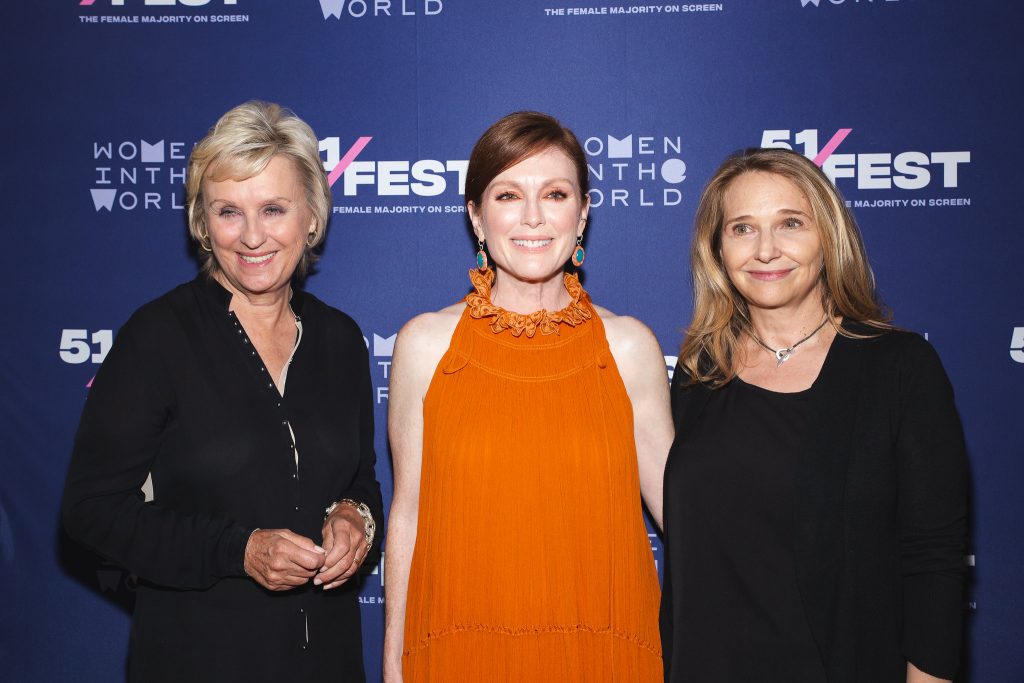
What kind of research did you do for playing Gloria Steinem in the biopic “Gloria: A Life on the Road,” directed and co-written by Julie Taymor?
The very, very best part of working on this project was getting to meet Gloria Steinem and to spend time with her voice and her writing and her world view. When you have somebody as inspiring as that to learn from, I was really grateful for the opportunity. It’s like a lesson on how to live.
Her tolerance, her patience, her consistency of message, her non-reactivity, I think that’s really remarkable, because we’re living in a time when people are very, very reactive, and it feels very hot. And when you watch Gloria all through her entire career, when you see what’s she faced as an advocate for women and what she withstood, it’s really amazing how tolerant she was of the things she came up against, and how she continues to educate slowly and carefully, with compassion. She really is remarkable.
What did you go for, in terms of building the Gloria Steinem character from inside out?
I read her book,s and I watched all the video I could find. The movie is based on her book “My Life on the Road,” and it’s a really beautiful meditation on what her beginnings were as an activist, and her beginnings as a human being and he family. At the very end of it, she talks about how her father didn’t have a home, and her mother didn’t have a place of her own, and how you need both. You need a journey and you need a home.
And she talks about the split, the division of us as males and females, and why it doesn’t work for anybody. I think that’s really important to start with who that person was or how her ideology was shaped. It really was, even as a child, witnessing what her parents went through.
Can you talk about your involvement in the Time’s Up movement and where you think the movement is going?
Time’s Up is super-exciting. The one thing that benefits us all as human beings is contact with people who are not like ourselves. We’re often so segregated by sex, by age, by race, by culture, by jobs. So there was this opportunity to be in a room with all of these women in New York City, of various ages and various jobs, and say, “Hey, what do you do, and how can we do to help each other?” Suddenly, you have this network of people, and it’s been astonishing.
And they go, “What group do you want to be in? Do you want to be in the social group or the mentoring group?” “I want to be in legal,” so I found myself in a group with incredible legal minds. As you know, [New York governor Andrew] Cuomo just adopted the Time’s Up Safety Agenda, which is major!
Time’s Up was formed in California, which is a very progressive state. New York, much less so. As we sitting around talking about things, we realized that the statute of limitations was so short on a lot of these sexual-assault claims. Otherwise, we can’t move forward.
What’s your perception of changes for women in the entertainment industry after Time’s Up?
I think it takes a long time to turn a ship around. It doesn’t happen overnight, but I do think that because we do have these relationships with one another, Time’s Up is about safety and equity for people in the workplace, not just for women in entertainment but for all industries. We’re able to band together with other women and say, “How do I put my weight behind you? How do we solve this problem? How do we solve that problem?” It’s been wonderful to have that collective influence. It’s been only a year [since Time’s Up was formed], so it hasn’t been very long, but I do think that suddenly, there’s a conversation again, where there wasn’t one a few years ago.

How much of a role stays with you when you’re done filming a project? Can you just shed a role like skin when you’re done?
Hell yeah! They cling to you as long as you’re working on them. One of the things I hate a reshoot. I hate additional shooting. That means you have to hang on to that character maybe for six months or something. I always want to let it go, because I feel very immersed in something when I’m doing it, but then when I’m done, I’m like, “Drop it.”
One of the great things for me was having children, working in the movies and having little children, so when you go home, it’s done. You come home and shut the door. You learn to compartmentalize, and I think that’s what I like.
Acting is almost like self-hypnosis. You have to put yourself in a position where you have to actually believe the stuff is happening to you, but you also have to know that it’s not really happening to you. So, when there are actors who are like, “Oh, my God, now I know what it’s like to be blind,” it’s like, no, you don’t! You were pretending!
Because of the contemporary women’s movement, there seems to be more pressure for female actors to play strong women who live extraordinary lives. Is there a place for female actors playing “regular women”?
I’m so happy you said that, because it makes me crazy. What powerful woman do I want to play? I’m just not interested. I want to play people who are human.
I think it’s where people make a mistake. It’s not about playing somebody who’s powerful. Also, [the word] “power”—I don’t like that terminology, because that’s about status. If somebody is powerful, they are somehow “higher” than another human being. That doesn’t interest me, the idea of being the most powerful.
I want to play somebody who’s the center of their own narrative. I don’t care who they are, as long as they’re a human being, and they’re in their own story. What I don’t want is the character who kind of comes in the end and says a couple things, picks up a dish, and leaves. Nobody wants to do that, because everyone is at the center of their own narrative. We don’t have to be heroic to be the center of our own story, but we are the heroes of our story.
What’s your process for finding great material?
I don’t know. I get that question, “What character do you want to play?” And I always say, “Characters don’t exist without a narrative.” I don’t know who that is. I can describe somebody who likes to eat out and lives in Seattle, and that kind of thing, but I don’t know who they are. What’s their story? Where’s the narrative? That fascinates me. I don’t know until I read it. And when I read it, and if I get excited by it really quickly, I know it’s something I want to pursue.
There are several female candidates running for president of the United States. Which one would you want to play?
Elizabeth Warren.

What’s more pernicious in Hollywood: ageism or sexism? Is ageism worse for women than for men?
Yeah, of course. The thing that’s interesting about sexism and ageism, well, now I’m going to get into looks-ism, so I’m segueing over there. If traditionally, we have an unequal society, where women have only been valued for their marriageability, that means youth and appearance are going to be primary, unless you’ve got some huge dowry, that’s a whole other socioeconomic thing. We are still in a culture where that has seeped in.
So, this idea of women having value only when they’re young and beautiful is still in our culture. It’s going to take a long, long time for us to shed that. And it’s really only going to happen when we have equal opportunity and equal pay and equal work. So, if you are a human being who is paid the same and has the same access to a job and to opportunities, and it doesn’t matter if you’re male or female, then that ageism and sexism will go away.
This thing about women feeling invisible makes me crazy. If there’s a 75-year-old man, and he is married, and he’s had a family, and he has a job and continues to be gainfully employed, and he has value, he’s never going to say that he feels invisible, because he has all this achievement behind him. But women, because they haven’t had the same opportunities, and haven’t necessarily been able to build that kind of career, are going to feel like they’re less important. Give that woman those opportunities, and she won’t feel invisible.
Is all the streaming content out there an opportunity for older actresses?
I think it’s an opportunity for everybody. One of the things I always try to remind people of is that the business doesn’t exist to give great parts to actors. The business exists to sell product globally. They’re just trying to figure out, “What can we sell all around the world?” So, it’s always been hard to find great parts for male or female actors.
I don’t know that Batman is a great part. I think it’s a fun part. I don’t think there’s an actor alive who would say, “Oh my God, that’s the role of my dreams.” People want to play complex, interesting characters—all of us, male and female. And suddenly, with all these platforms opening up, there are opportunities for everybody that are really exciting.
How long have you and Bart been married?
We’ve been together for 23 years … We lived together for seven years and had two children before we got married.
Why did you decide to get married after seven years and two children?
It just felt messy [to be unmarried]. I actually had a therapist say to me that she felt that marriage was like a container for a family. It made sense. It’s what we have as a culture to say, “We belong to each other. We’ll take care of each other. We well share each other’s money and houses and whatever.”
It’s a public proclamation of who you are in society as a couple and as a family, which is why marriage equality is so important. Everybody deserves that. Everybody needs an opportunity to say legally, “This is my family. This is who we are.”
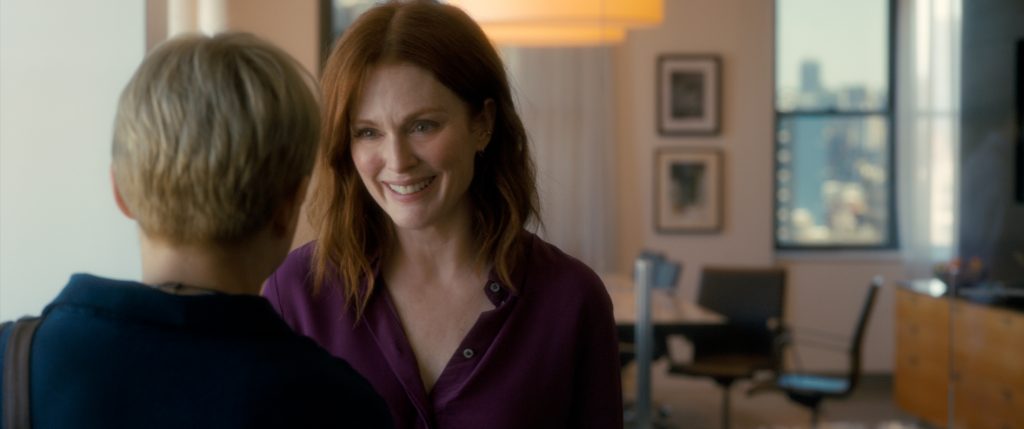
Do you and Bart actively look to do projects together?
Well, we are now. As the business has changed, people start realizing that they can take responsibility for producing things, for developing things. Suddenly, we’re all going, “Hey, I can be a producer” or “I can hire a writer” or “I can acquire this book.” So, Bart and I are now looking at things we’d like to do together.
What’s next for you?
My next project is a Stephen King project for Apple called “Lisey’s Story” that Pablo Larraín is going to direct. I’m very excited about it because it’s a story of this marriage. These people have been together for years and years. It’s a romance but it’s also horror. It’s emotional.
I love horror. It’s interesting that it’s so popular now, because it’s so reflective of our emotional state, right? In horror, you’re always like, “Who is the monster? What is the monster? What’s happening?” This [“Lisey’s Story”] is really about this journey this woman takes to go find her husband, and it brings her literally into another place.
Except for Bart, which director do you think has gotten your best work?
I will say that your best work happens when you’re comfortable, not when you’re not comfortable. Your best work happens when you’re able to feel free, and you can do whatever you want to do, and kind of, sort of fly. I dislike it when people make an actor feel precarious. Then you don’t really go where you want to go.
I will say that think working with Todd Haynes was really extraordinary, because he does provide such an incredible amount of structure, just in terms of his language … how he frames shots, how he tells stories cinematically, how he tells them linguistically, I always feel like I have a lot of room within that structure to find stuff.
Can you talk about your relationship with Tom Ford? He’s been your director and you’ve collaborated with him in fashion.
He’s awesome! My part [in the 2009 movie “A Single Man,” Tom Ford’s directorial debut] shot in only three days. It was really, really quick … I remember it was so exciting because the music that he chose was so fantastic. It felt free! It was a beautiful set. Tom had set it up so that we were able to feel free.
“After the Wedding” opens in select U.S. cities on August 9, 2019.


